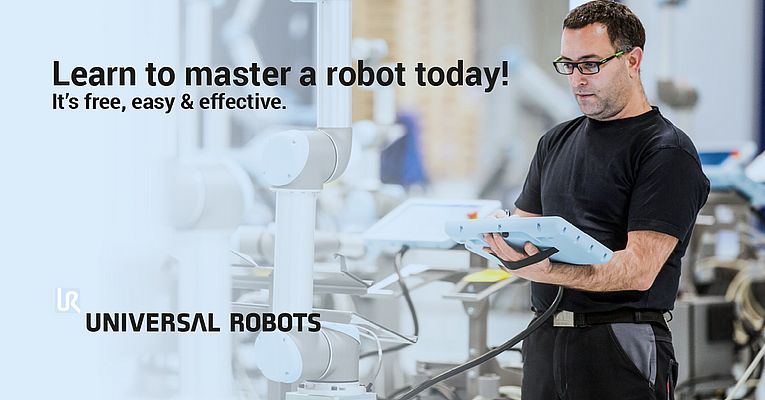Universal Robots has developed online training modules to further lower the automation barrier. The hands-on modules are offered free of charge, open to all, and built to deliver hands-on learning via interactive simulations to maximize user engagement. Learning how to set up and program a collaborative robot – or cobot – no longer depends on real life access to a robot or a training class. Now everybody with a desire to learn the concepts of cobots can log into the Universal Robots Academy and get the introduction necessary to master basic programming skills.
CTO and founder of Universal Robots, Esben Østergaard, explains that it is unusual in the industry to make a robot training curriculum of this kind available for free. “But this is a long-term investment for us. We want to raise the robot literacy and the reason for speeding up the entry of cobots is not only to optimize production here and now,” says Østergaard. “We are facing a looming skills gap in the manufacturing industry that we need to bridge by all means possible. Facilitating knowledge creation and access to our robots is an important step in that direction.”
The online training modules are available in English, Spanish, German, French and Chinese, consisting of six e-learning modules that make up the basic programming training for UR robots. This includes configuring end-effectors, connecting I/Os, creating basic programs in addition applying safety features to an application.
One of the early adopters of the Universal Robots Academy is the Whirlpool Corporation where the online training modules now provide the basic foundation for all UR robot training at the company’s plant in Ohio, USA. Tim Hossler, Controls Engineer at Whirlpool, emphasizes the great convenience of being able to offer this resource to employees in-house: “Now we don’t have to wait and send them out for basic training elsewhere. The modules can be completed at our own pace and we can even pick and choose which modules we offer different personnel depending on skill sets and their level of interaction with the robots,” says Hossler.
“I really like the interactive approach, it makes learning very hands-on and transferable to what we would actually be doing here at our plant. I was also pleasantly surprised that the modules were free of charge for anyone to use. It definitely increases the accessibility of the UR robots.”
Stefan Stubgaard, Global Product Manager at Universal Robots, says that the academy modules have received positive feedback from users around the world: “This learning resource is now also reaching small and medium-sized manufacturers that up until now regarded robotics as costly and complex, says Stubgaard. “By simply logging into the Academy they experience first-hand how simple the setup can be and they can easily envisage what production tasks could be automated with the cobots. We will definitely be adding more modules to complement our basic offering going forward.”




























































